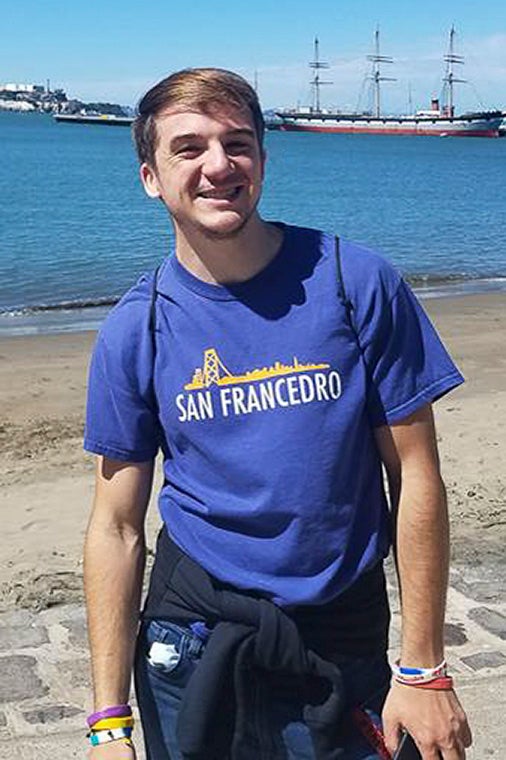Stanford junior wins 2018 Truman Scholarship for graduate studies
Jack Andraka hopes to put his training in engineering, anthropology and data science to work as a public health physician devoted to addressing global health inequities affecting citizens in low- and middle-income countries.
The Harry S. Truman Scholarship Foundation has named Jack Andraka, a Stanford junior majoring in anthropology and in electrical engineering, as a 2018 Truman Scholar.
Andraka was one of 59 exceptional college students chosen from across the nation for the scholarship, which provides up to $30,000 for graduate study – in the United States or abroad – to students who want to attend graduate school in preparation for a career in public service.

Jack Andraka (Image credit: Luke Andraka)
The U.S. Congress created the Truman Scholarship Foundation in 1975 to be the nation’s living memorial to President Harry S. Truman, who served as president from 1945 to 1953. Truman Scholars also have the opportunity to participate in professional development programs to help prepare them for careers in public service leadership, including a Summer Institute internship in Washington, D.C., and the Truman Scholar Leadership Week in Missouri.
Andraka, 21, of Crownsville, Maryland, plans to attend the Truman Scholarship Foundation’s Summer Institute and work as an intern at Physicians for Human Rights, a nonprofit organization that uses medicine and science to document and call attention to mass atrocities and severe human rights violations. Andraka’s honors thesis in anthropology under Duana Fullwiley, an associate professor of anthropology, focuses on Sierra Leone: Disease Dollars: An Ethnographic Study of Foreign Aid and Ebola in Sierra Leone. Andraka hopes to study how environmental contaminants violate the health and human rights of disadvantaged populations in the impoverished West African country.
Andraka is also writing an honors thesis in electrical engineering, A Novel Paper Biosensor for the Detection of Infectious Diseases and Environmental Contaminants, which describes the sensors he developed that detect 20 different diseases or contaminants in five minutes at a cost of less than one cent.
As a Truman Scholar, Andraka intends to enter an MD/MPH (Doctor of Medicine/Master of Public Health) program specializing in global health.
“The MD degree would enable me to frame my engineering background within medicine and provide me with an appreciation for the clinical realities of working in global health,” Andraka wrote in his Truman Scholarship application. “In doing so, I will be able to work with communities in clinical settings to better understand locally relevant issues and design programs to address them. The Master of Public Health degree, alongside my anthropology training, will provide me with a deep understanding of broader socioeconomic, environmental and political determinants of health.”
Eventually, Andraka hopes to become a public health physician devoted to addressing the global health inequities in low- and middle-income countries, where life expectancy is 36 years lower than in high-income countries.
About the inequities Andraka wrote: “To meet that challenge, the global health community must innovate, not renovate, working to address all determinants of health and designing technologies for the global poor. As a public health physician trained in engineering, anthropology and data science, I hope to treat these inequities via interdisciplinary solutions that marry groundbreaking technology and big data techniques with community-based strategies. Through these efforts, I will work to ensure that everyone is granted the most basic human right – the right to survive.”
At Stanford, Andraka has been engaged in the Quake Lab, through the Research Experience for Undergraduates program of the Department of Bioengineering, on electrically actuated microfluidic valves with applications in biosensing, environmental monitoring and implantable medical devices.
Last summer, Andraka conducted an independent research project under Utkan Demirci, a professor of radiology, on developing a simple paper biosensor to detect HIV-1 based on colloidal photonic crystals fabricated using inkjet printing. His research demonstrated that the biosensor could detect not only the HIV virus but could also be easily extended to a variety of diseases from myocardial infarctions to influenza.
He also served as head of curriculum under Dr. Larry Chu, professor of anesthesiology, preoperative and pain medicine, for the Stanford Anesthesiology Summer Institute, a two-week program for undergraduates and high school students interested in exploring careers in science, technology, engineering and math, as well as medicine and health technology.
For the past three years, Andraka has built the Watertech Initiative, an LLC that uses biosensors and crowd-sourced data collection to improve access to clean drinking water in northwestern Tanzania. At first, the community did not see the benefit of the sensor he had developed, which revealed that their water was contaminated. Over the next year, Andraka worked closely with the community to tailor the biosensor to their needs, and created an app that gave directions to the nearest clean water source and how to treat contaminated water. Later, he spoke with a government agency to refine which contaminants to monitor and to send weekly, reader-friendly pollution maps to communities.
“Armed with these maps, the community sought to prevent future water contamination, so I added an app feature to text information on local advocacy efforts,” he wrote in his Truman Scholarship application.
“Within a month of adding this feature, this collaborative effort created over 100,000 data points, detailing the environmental impacts of mining corporations in the district, with over 2,000 citizens using the sensors weekly. Through this work, I realized that leadership is more than implementing the vision of an individual. It is listening and working with communities to pursue a shared goal. Now, my fellow water warriors and I are pursuing legal action against 14 mining corporations for environmental exploitation.”
